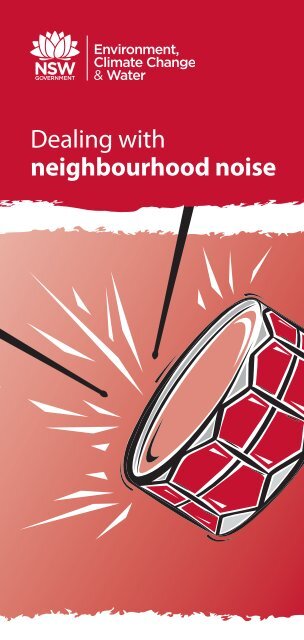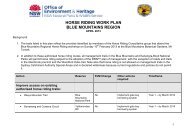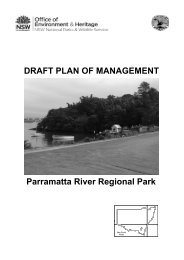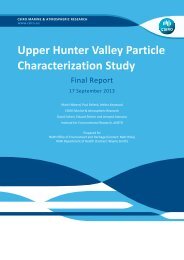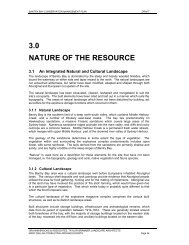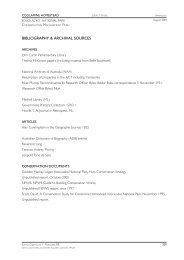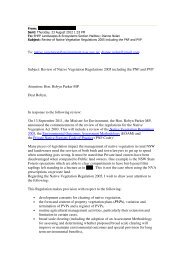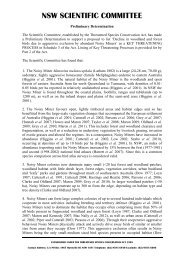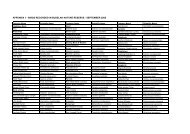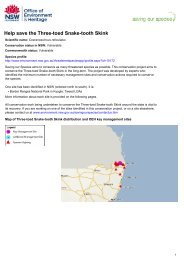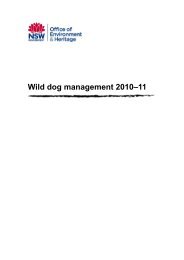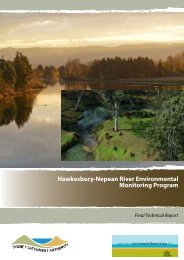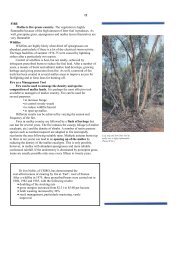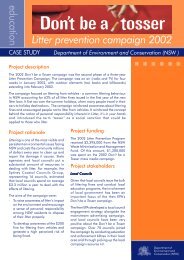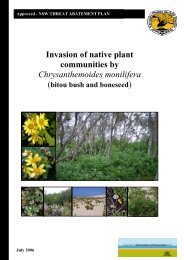Dealing with neighbourhood noise brochure - Department of ...
Dealing with neighbourhood noise brochure - Department of ...
Dealing with neighbourhood noise brochure - Department of ...
You also want an ePaper? Increase the reach of your titles
YUMPU automatically turns print PDFs into web optimized ePapers that Google loves.
<strong>Dealing</strong> <strong>with</strong><br />
<strong>neighbourhood</strong> <strong>noise</strong>
2<br />
Preventing <strong>neighbourhood</strong> <strong>noise</strong><br />
Neighbourhood <strong>noise</strong>, such as <strong>noise</strong> from animals,<br />
alarms, machines and parties can be very annoying. You<br />
can <strong>of</strong>ten stop <strong>noise</strong> that disturbs you <strong>with</strong>out involving<br />
your council, the police or the <strong>Department</strong> <strong>of</strong> the<br />
Environment, Climate Change and Water NSW (DECCW).<br />
This <strong>brochure</strong> outlines steps you can take to prevent<br />
<strong>noise</strong> being an issue for you.<br />
When <strong>noise</strong> annoys<br />
There are laws that tell us what levels <strong>of</strong> <strong>noise</strong> are<br />
acceptable. Yet how we respond to particular <strong>noise</strong>s<br />
depends on the type <strong>of</strong> <strong>noise</strong> and how we feel about it.<br />
What is fine one day can drive us to distraction the next,<br />
and <strong>noise</strong> that is acceptable to one person may<br />
be unacceptable to another.<br />
Recognising how our moods can influence our response<br />
helps us judge when others are being too noisy.<br />
If a source <strong>of</strong> <strong>noise</strong> is a problem for you, there are several<br />
things you can do.<br />
Talk to people<br />
Try to solve the problem<br />
amicably by talking to<br />
whoever is causing the<br />
<strong>noise</strong>. Often people do<br />
not realise they are<br />
being noisy and are<br />
happy to work <strong>with</strong><br />
you to solve the problem<br />
as alternatives are<br />
<strong>of</strong>ten available.
Contact a Community Justice Centre<br />
If the <strong>noise</strong> continues, you can contact a Community<br />
Justice Centre (CJC). These are government-funded but<br />
independent centres that specialise in settling differences<br />
between neighbours <strong>with</strong>out entering into complicated<br />
legal processes. A CJC will suggest a mediation process.<br />
This is where you meet <strong>with</strong> the people who are making<br />
the <strong>noise</strong>, together <strong>with</strong> a CJC representative, to try and<br />
solve the problem. This process will not cost you any<br />
money, and has a high success rate.<br />
For information on your nearest CJC, visit www.cjc.nsw.<br />
gov.au or check the CJC contact details at the back <strong>of</strong><br />
this <strong>brochure</strong>.<br />
If your neighbour will not attend a mediation session, and<br />
the <strong>noise</strong> continues, you can do the following:<br />
Contact your local council<br />
<strong>neighbourhood</strong> <strong>noise</strong><br />
Under the Protection <strong>of</strong> the Environment Operations Act<br />
1997 (POEO Act), local councils can serve various notices<br />
on people occupying homes and businesses, requiring<br />
them to control <strong>of</strong>fensive <strong>noise</strong> and advising them what<br />
<strong>noise</strong> levels are acceptable.<br />
A prevention notice contains conditions on ways <strong>of</strong><br />
preventing or stopping <strong>noise</strong>, and is issued under<br />
section 96 <strong>of</strong> the POEO Act.<br />
3
4<br />
A <strong>noise</strong> control notice sets an acceptable <strong>noise</strong> level for<br />
a specific item <strong>of</strong> noisy equipment, and is issued under<br />
section 264 <strong>of</strong> the POEO Act. Councils can serve notices<br />
covering <strong>noise</strong> from animals and from a wide range<br />
<strong>of</strong> appliances including air conditioners, swimming<br />
pool pumps, heat pump water heaters, radios, sound<br />
reproduction equipment, musical instruments, power<br />
tools, lawn mowers and burglar alarms. The notice can<br />
require the noisy activities to be restricted to certain times<br />
<strong>of</strong> the day or certain days. If the notice is not complied<br />
<strong>with</strong>, the council can issue a fine or can prosecute.<br />
People who receive a notice can appeal against it.
<strong>neighbourhood</strong> <strong>noise</strong><br />
Seek a <strong>noise</strong> abatement order<br />
If your neighbour is continually being noisy, has a noisy<br />
animal or is using noisy appliances, and you decide to<br />
take action independently <strong>of</strong> the local council or other<br />
regulator, you can seek a <strong>noise</strong> abatement order under<br />
section 268 <strong>of</strong> the POEO Act. To apply for an order, contact<br />
your local court (listed under ‘Local Courts’ in the White<br />
Pages). You may also consider asking your legal adviser for<br />
help. You can contact the registry staff at your local court<br />
who will explain the process to you. There are fees for<br />
applying for a <strong>noise</strong> abatement order.<br />
If the court is satisfied that the neighbour is causing an<br />
<strong>of</strong>fensive <strong>noise</strong> or that the <strong>noise</strong> is likely to recur, it may<br />
order them to stop the <strong>noise</strong> or prevent a recurrence.<br />
If the person fails to comply <strong>with</strong> the order, they<br />
could be prosecuted.<br />
The person responsible for causing the <strong>noise</strong> can appeal<br />
against the order.<br />
The DECCW <strong>brochure</strong>, Seeking a <strong>noise</strong> abatement order<br />
contains more details.<br />
5
6<br />
When the <strong>noise</strong> is a one-<strong>of</strong>f problem<br />
If you are disturbed by a particular incident like amplified<br />
music, contact your local council or the local police<br />
station. They can issue a warning (see Noisy domestic<br />
equipment) or issue a <strong>noise</strong> abatement direction under<br />
section 276 <strong>of</strong> the POEO Act directing a person to stop<br />
making the <strong>of</strong>fensive <strong>noise</strong>.<br />
A <strong>noise</strong> abatement direction may be issued at any time <strong>of</strong><br />
the day or night and can remain in force for up to 28 days<br />
from the time it was issued. A person who fails to comply<br />
<strong>with</strong> it can be issued <strong>with</strong> an on-the-spot fine <strong>of</strong> $200<br />
($400 for a corporation). Noise abatement directions<br />
cannot be appealed against. The police and authorised<br />
<strong>of</strong>ficers <strong>of</strong> councils have powers that allow them to seize<br />
equipment used to make <strong>noise</strong> (e.g. a sound system in<br />
contravention <strong>of</strong> a <strong>noise</strong> abatement direction).
What is <strong>of</strong>fensive <strong>noise</strong>?<br />
<strong>neighbourhood</strong> <strong>noise</strong><br />
The definition <strong>of</strong> <strong>of</strong>fensive <strong>noise</strong> in the POEO Act is <strong>noise</strong>:<br />
(a) that, by reason <strong>of</strong> its level, nature, character or quality, or<br />
the time at which it is made, or any other circumstances:<br />
(i) is harmful to (or is likely to be harmful to) a person who<br />
is outside the premises from which it is emitted, or<br />
(ii) interferes unreasonably <strong>with</strong> (or is likely to interfere<br />
unreasonably <strong>with</strong>) the comfort or repose <strong>of</strong> a<br />
person who is outside the premises from which it is<br />
emitted, or<br />
(b) that is <strong>of</strong> a level, nature, character or quality prescribed<br />
by the regulations or that is made at a time, or in other<br />
circumstances, prescribed by the regulations.<br />
For further information about what constitutes <strong>of</strong>fensive<br />
<strong>noise</strong> see the Noise Guide for Local Government at<br />
www.environment.nsw.gov.au/<strong>noise</strong>/nglg.htm<br />
7
8<br />
Common types <strong>of</strong> <strong>noise</strong><br />
Barking dogs<br />
For advice on this issue see the DECCW <strong>brochure</strong> <strong>Dealing</strong><br />
<strong>with</strong> barking dogs.<br />
Noisy vehicles<br />
For advice on this issue see the DECCW <strong>brochure</strong><br />
Managing vehicle <strong>noise</strong>.<br />
Noisy alarms<br />
For annoying building and car alarms, contact the police or<br />
your council. Their <strong>of</strong>ficers can issue penalty notices when<br />
alarms sound for longer than the period specified below.<br />
It is an <strong>of</strong>fence for a building intruder alarm to be heard in<br />
other homes unless it stops sounding <strong>with</strong>in 5 minutes (or<br />
<strong>with</strong>in 10 minutes if installed before 1 December 1997). It<br />
is an <strong>of</strong>fence for a car alarm that can be heard anywhere<br />
to sound for more than 45 seconds (or more than 90<br />
seconds for a car manufactured before 1 September 1997).<br />
For building alarms, and for vehicles manufactured on<br />
or after 1 March 2009, no distinction is made between<br />
an alarm sounding because <strong>of</strong> a break-in or because it is<br />
faulty. For vehicles manufactured before 1 March 2009,<br />
a defence is provided in the Regulation for alarms that<br />
sound because <strong>of</strong> an accident or illegal entry.
<strong>neighbourhood</strong> <strong>noise</strong><br />
The police and council <strong>of</strong>ficers may issue penalty notices<br />
for continuously or intermittently sounding alarms.<br />
Penalties for individuals are: $200 if the alarm sounds for<br />
up to 4 hours, $400 if it sounds between 4 and 8 hours,<br />
and $600 if it sounds for longer than 8 hours. Penalties for<br />
corporations are double those for individuals.<br />
For more details, see the DECCW <strong>brochure</strong> Managing <strong>noise</strong><br />
from intruder alarms.<br />
Noise from pubs and clubs<br />
The Office <strong>of</strong> Liquor, Racing and Gaming manages <strong>noise</strong> from<br />
licensed premises such as pubs and clubs. When the Office<br />
licenses these premises, it may place environmental <strong>noise</strong><br />
conditions on the licence. These conditions typically include<br />
a requirement that the <strong>noise</strong> from pubs and clubs should not<br />
be heard inside any home between midnight and 7 am on<br />
any night. The Office can be contacted on (02) 9995 0300.<br />
Noisy domestic equipment<br />
The Protection <strong>of</strong> the Environment Operations (Noise<br />
Control) Regulation 2008 specifies the times when <strong>noise</strong><br />
from domestic activities should not be heard in a neighbour’s<br />
home. If a person fails to comply <strong>with</strong> a warning from<br />
the police or council for operating noisy equipment such<br />
as power tools, sound systems, musical instruments, air<br />
conditioners, pool pumps or heat pump water heaters<br />
during restricted times, an on-the-spot fine may be issued.<br />
An on-the-spot fine <strong>of</strong> $200 ($400 for corporations) may<br />
be imposed on anyone who continues to make <strong>noise</strong> up<br />
to 28 days after being warned to stop by an authorised<br />
DECCW <strong>of</strong>ficer, the police, or a local council <strong>of</strong>ficer.<br />
The times when these noisy appliances should not<br />
be used if they can be heard inside certain rooms <strong>of</strong> a<br />
neighbour’s residence are listed in Table 1, <strong>with</strong> advice on<br />
who to contact if you need help.<br />
9
10<br />
Table 1: Time restrictions when <strong>noise</strong> from<br />
residential premises should not be heard inside<br />
a neighbour’s residence<br />
Noise source – from residential premises<br />
Power tools and equipment (powered garden tools –<br />
e.g. lawn mowers and leaf blowers – electric or pneumatic<br />
tools, chainsaws, circular saws, gas or air compressors and<br />
swimming pool or spa pumps)<br />
Musical instruments and electrically amplified sound<br />
equipment (e.g. radios, TVs, tape recorders, CD and<br />
DVD players, and home theatre systems)<br />
Air conditioners and heat pump water heaters<br />
Motor vehicles (except when entering or leaving<br />
residential premises)<br />
Refrigeration units fitted to motor vehicles**<br />
*Habitable room means any room other than a garage, storage area,<br />
bathroom, laundry, toilet or pantry.<br />
** This applies whether or not the vehicle is located on residential<br />
premises.<br />
The penalty for breaching the legislation is $200 for individuals and<br />
$400 for corporations. The maximum penalty that a court can impose<br />
is $5500 for individuals and $11,000 for corporations.
Time restrictions when <strong>noise</strong> should<br />
not be heard in a habitable room *<br />
in a neighbour’s residence<br />
8 pm to 8 am on Sundays<br />
and public holidays<br />
8 pm to 7am on weekdays and Saturdays<br />
Midnight to 8 am on Friday, Saturday<br />
or any day preceding a public holiday<br />
10 pm to 8 am on any other day<br />
10 pm to 8 am on weekends<br />
and public holidays<br />
10 pm to 7 am on weekdays<br />
8 pm to 8 am on weekends<br />
and public holidays<br />
8 pm to 7 am on weekdays<br />
8 pm to 8 am on weekends<br />
and public holidays<br />
8 pm to 7 am on weekdays<br />
<strong>neighbourhood</strong> <strong>noise</strong><br />
Contact<br />
Local council<br />
or police<br />
Local council<br />
or police<br />
Local council<br />
or police<br />
Local council<br />
or police<br />
Local council<br />
or police<br />
Outside these hours councils and police can still place<br />
restrictions on the use <strong>of</strong> these articles if they are causing<br />
‘<strong>of</strong>fensive <strong>noise</strong>’.<br />
Councils can control <strong>of</strong>fensive <strong>noise</strong> by issuing prevention<br />
notices, <strong>noise</strong> control notices or <strong>noise</strong> abatement directions.<br />
Police can issue <strong>noise</strong> abatement directions or you may<br />
seek a <strong>noise</strong> abatement order from the local court.<br />
11
12<br />
Table 2: Noise from other sources – who to contact<br />
Noise source Contact<br />
Industrial/commercial <strong>noise</strong><br />
• Large industrial complexes DECCW Environment Line,<br />
phone: 131 555<br />
• Smaller factories and backyard Local council<br />
workshops<br />
• Commercial premises –<br />
ventilation, air conditioning,<br />
refrigeration<br />
Transport <strong>noise</strong><br />
• Commercial airports and<br />
aircraft in flight<br />
• Aircraft on ground at private<br />
and council controlled airports<br />
• Noisy motor vehicles<br />
(including trail bikes) in a<br />
public place such as:<br />
- roads, verges and car parks<br />
- <strong>of</strong>f road, including parks<br />
and reserves<br />
• Noisy motor vehicles<br />
(including trail bikes)<br />
on private property<br />
• Road traffic:<br />
- Local roads<br />
- Freeways, tollways, main roads<br />
Local council<br />
National Noise Inquiry Line<br />
1300 302 240<br />
Local council<br />
DECCW Environment Line,<br />
phone: 131 555,<br />
or Police Assistance Line,<br />
phone: 131 444<br />
or local council<br />
Police Assistance Line,<br />
phone: 131 444 or<br />
local council<br />
Local council<br />
RTA, phone: 1300 308 349<br />
• Rail <strong>noise</strong> DECCW Environment Line,<br />
phone: 131 555 or<br />
Your Say Line,<br />
phone: 1300 656 999<br />
• Naval vessels Defence <strong>Department</strong>,<br />
phone: 1300 333 362<br />
• Container and<br />
passenger ships<br />
Ports Corporation:<br />
Sydney, phone: 9296 4999<br />
Port Kembla,<br />
phone: 4275 0100<br />
Newcastle,<br />
phone: 1800 048 205
Noise source Contact<br />
• Recreational boating,<br />
jet skis<br />
• Amplified music<br />
from vessels<br />
Construction <strong>noise</strong><br />
• Road construction:<br />
- Freeways and tollways<br />
- Main roads<br />
- Other roads<br />
• Building construction<br />
• Major public infrastructure<br />
Public sporting and<br />
entertainment venues<br />
• Motor sports and gun/ rifle/<br />
pistol clubs<br />
• Sporting facilities (other<br />
than vessels)<br />
• Aquatic sporting events<br />
<strong>neighbourhood</strong> <strong>noise</strong><br />
NSW Maritime,<br />
phone: 131 256<br />
NSW Maritime,<br />
phone: 131 256 or<br />
Water police, phone:<br />
9320 7499 or local council<br />
DECCW Environment Line,<br />
phone: 131 555<br />
RTA, phone: 1300 308 349<br />
Local council<br />
Local council<br />
DECCW Environment Line,<br />
phone: 131 555<br />
Local council<br />
Local council<br />
• Concert facilities Local council<br />
• Concerts at major state<br />
venues (e.g. SCG, the Domain,<br />
Centennial Park, Moore Park,<br />
Olympic Park)<br />
Neighbourhood <strong>noise</strong><br />
• Noise in public places, animal<br />
<strong>noise</strong>, barking dogs<br />
• Intruder alarms for buildings<br />
and vehicles<br />
NSW Maritime, phone: 131 256<br />
DECCW Environment Line,<br />
phone: 131 555<br />
Local council or Police<br />
Assistance Line, phone 131 444<br />
Local council or Police<br />
Assistance Line, phone: 131 444<br />
13
14<br />
How to prevent<br />
<strong>neighbourhood</strong> <strong>noise</strong> problems<br />
What is music to your ears may just be <strong>noise</strong> to your<br />
neighbour. Try to make sure that your activities at home<br />
do not become a nuisance to others by showing them<br />
some consideration. People can become extremely upset<br />
by <strong>noise</strong> they have no control over. Noise can aggravate<br />
stress, particularly if sleep is disturbed, as fatigue can<br />
result in heightened sensitivity and irritability. Here are<br />
some things you can do to keep the peace in<br />
your <strong>neighbourhood</strong>:<br />
• Let your neighbours know in advance if you are going<br />
to be doing something noisy like having a party, doing<br />
building work or using a chainsaw etc. Most people<br />
appreciate the courtesy and will be less likely to<br />
complain. They can also get away from the <strong>noise</strong> if they<br />
really need to.<br />
• Be mindful <strong>of</strong> your neighbours when playing amplified<br />
music or using power tools etc, even <strong>with</strong>in the times<br />
permitted by the Noise Regulation. Remember, <strong>of</strong>fensive<br />
<strong>noise</strong> can occur at any time.<br />
• Keep the <strong>noise</strong> in your backyard or on your balcony<br />
down so it won’t disturb your neighbours, especially<br />
during the evening and at night.<br />
• Avoid revving your car’s engine repeatedly when you<br />
turn on your car’s ignition. Also, remember to turn the<br />
car stereo down when coming home late at night and<br />
try not to slam doors.<br />
• Choose quiet models when buying equipment such as<br />
air conditioners, hot water heat pumps, pool pumps and<br />
rainwater tank pumps.
<strong>neighbourhood</strong> <strong>noise</strong><br />
• Think about the impact on your neighbours when<br />
installing this equipment. Place air conditioners and<br />
hot water heat pumps away from your neighbour’s<br />
bedroom and living room windows or have the<br />
equipment acoustically shielded to ensure neighbours<br />
are not affected. For more information see the Australian<br />
Institute <strong>of</strong> Refrigeration, Air-conditioning and Heating<br />
guidance at www.fairair.com.au/Calculator.Noise.aspx<br />
• Enclose pool and spa pumps to muffle the <strong>noise</strong> so it<br />
does not reach your neighbours and run pumps only<br />
when necessary <strong>with</strong>in the permitted times.<br />
• Choose quiet models when purchasing or hiring garden<br />
equipment such as leaf blowers, string trimmers, edge<br />
cutters and lawn mowers.<br />
• If possible, use a broom or a rake instead <strong>of</strong> a leaf blower.<br />
If you must use a leaf blower, don’t start too early, use it<br />
for short periods and avoid revving it repeatedly. These<br />
devices are <strong>of</strong>ten much quieter but just as effective when<br />
used at around half the maximum power.<br />
15
16<br />
Contacts<br />
DECCW<br />
Environment Line 131 555<br />
Councils<br />
Contact details for all NSW<br />
councils can be found on the<br />
Local Government Directory<br />
page <strong>of</strong> the <strong>Department</strong> <strong>of</strong><br />
Local Government’s website<br />
www.dlg.nsw.gov.au<br />
Police<br />
Police Assistance Line,<br />
phone: 131 444<br />
Police stations are listed under<br />
‘Police’ in the Business and<br />
Government edition <strong>of</strong> the<br />
White Pages<br />
www.whitepages.com.au<br />
Community Justice Centres<br />
Contact Details<br />
Phone: 1800 990 777,<br />
8688 7455 or 4925 0333<br />
Fax: 8688-9615 or 4925 0300<br />
Email: cjc_sydney@agd.<br />
nsw.gov.au<br />
Website: www.cjc.nsw.gov.au:<br />
TTY: 1800 671 964<br />
Address: Level 5,<br />
Parramatta Justice Precinct<br />
160 Marsden Street,<br />
Parramatta NSW 2150<br />
Published by:<br />
<strong>Department</strong> <strong>of</strong><br />
Environment, Climate<br />
Change and Water NSW<br />
59–61 Goulburn Street<br />
PO Box A290<br />
Sydney South 1232<br />
Phone: (02) 9995 5000<br />
(switchboard)<br />
Phone: 131 555<br />
(environment information<br />
and publications requests)<br />
Phone: 1300 361 967<br />
(national parks, climate<br />
change and energy efficiency<br />
information and publications<br />
requests)<br />
Fax: (02) 9995 5999<br />
TTY: (02) 9211 4723<br />
Email: info@environment.<br />
nsw.gov.au<br />
Website: www.environment.<br />
nsw.gov.au<br />
ISBN 978 1 74232 619 1<br />
DECCW 2010/270<br />
May 2010<br />
Printed on paper manufactured by<br />
sustainable resources


